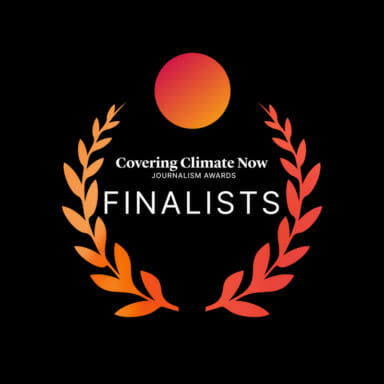If climate change is the biggest news story of our time, then the 2024 elections should be the biggest politics story of our time. 2024 will bring elections — not only in the United States but also the United Kingdom, the European Union, India, Indonesia, Mexico, and more — that will profoundly affect humanity’s chances of preserving a livable planet.
Journalists need to start thinking now about how to provide elections coverage that (1) is grounded in science, and (2) gives voters the information they need to cast ballots wisely. CCNow has best practices and other resources that can get you up to speed.
Getting the framing right is essential, a roundtable of journalists and media experts recently advised. “Newsroom leaders should cut back on horse race coverage in favor of news stories about how the different candidates and parties would govern,” wrote Dan Froomkin, a veteran reporter who convened the roundtable for Press Watch.
For climate change, the right frame is science, not politics. Our elections coverage should be grounded in what science says and what the contending candidates and parties plan to do about that — not which candidates are ahead or behind.
Reporters and editors on politics desks are the ones who handle most elections coverage, so it’s crucial that they understand that climate science is unambiguous. “Climate breakdown has begun,” UN Secretary-General António Guterres said on Wednesday, and only a very rapid global phase out of oil, gas, and coal can keep it from getting much worse. Such a phase-out might seem economically infeasible, but science, unlike politics, doesn’t compromise — and the economics get more dire the longer humanity waits to act decisively.
Voters need to know about this science, and they need to know which candidates and parties will do something about it and which will not. As journalists we should ask candidates not whether they believe in climate change (as Fox did last month at the first US Republican presidential debate), but rather, “What will you do about climate change? How do you plan to cut emissions in half by 2030, as science requires?”
Climate is hardly the only issue in 2024. But it overlaps with most of the other big questions facing voters, notably the economy — the topmost concern of most voters in most countries — and, in the US especially, the future of democracy.
Philadelphia Inquirer columnist Will Bunch argues that the media must not treat 2024 as business-as-usual — not when one of the two parties is controlled by a man who openly disdains democratic governance, as demonstrated by Trump’s attempts to overturn his 2020 election loss through intimidation and violence. Unless the media talk “a lot more about the stakes — including Trump’s plans to dismantle the democratic norms that he calls “the administrative state,” Bunch wrote, next year’s election in the US “might also be the last.”
The same holds for climate. Trump and nearly every Republican in Congress think that nothing should be done about the climate crisis except make it worse by burning lots more fossil fuels. Some traditional journalists might see stating the facts so plainly as partisan. But that mistakenly conflates politics with partisanship. Candidates are free to take whatever position they like on issues. Our job as journalists is to describe those positions accurately and fairly. Voters can decide for themselves what to do about it.
From Us
Up2Us2023. The New York Society for Ethical Culture is hosting “Up2Us2023: A Better World is Possible.” It will feature filmmakers, climate scientists, activists, storytellers, movement builders, and journalists who are transforming the climate conversation. The 2023 Covering Climate Now Documentary Award winners will be announced at this event. September 18. In-person and online. RSVP.
Climate Changes Everything. Join leading journalists for a two-day conference, September 21 and 22, at Columbia Journalism School in New York City. A preliminary agenda for the conference, which features panels, workshops, as well as special guest interviews with White House National Climate Advisor Ali Zaidi and former UNFCCC Executive Secretary Christiana Figueres, is now live. This free conference is co-hosted by CCNow, Columbia Journalism Review, The Nation, the Guardian, and Solutions Journalism Network. Working journalists will receive priority in registration. Apply to attend.
We’re hiring! Covering Climate Now is considering applications for two positions: freelance graphic designer and freelance newsletter writer. Due September 18. Apply here.
The Finalists: Photography, Multimedia, and Social Media
We’re previewing Covering Climate Now Journalism Award finalists’ work
 This week, we’re bringing you three different categories of finalists. Travel to melting Himalayan glaciers, Indian farms, Alaskan fishing vessels, an elephant sanctuary in East Africa, the Colorado River region, and the most northern civilian settlement in the world with our photography finalists. Our multimedia finalists shed light on toxic mining in Brazil, incarcerated people suffering climate-related disasters, shrinking lakes across the Nile River basin, ecosystem destruction in Mexico, and regional climate change impacts in Malaysia. Lastly, our social media finalists cover everyday climate heroes in Ireland, TikTok reporting, and Instagram explainers. See the finalists.
This week, we’re bringing you three different categories of finalists. Travel to melting Himalayan glaciers, Indian farms, Alaskan fishing vessels, an elephant sanctuary in East Africa, the Colorado River region, and the most northern civilian settlement in the world with our photography finalists. Our multimedia finalists shed light on toxic mining in Brazil, incarcerated people suffering climate-related disasters, shrinking lakes across the Nile River basin, ecosystem destruction in Mexico, and regional climate change impacts in Malaysia. Lastly, our social media finalists cover everyday climate heroes in Ireland, TikTok reporting, and Instagram explainers. See the finalists.
Noteworthy Stories
Protecting Alaska (and more). The Biden administration announced on Wednesday it will cancel all oil and gas leases in the Arctic National Wildlife Refuge, which were opened under President Donald Trump, and prohibit drilling in about half of the National Petroleum Reserve in Alaska. The controversial Willow Drilling Project will still move forward. By Lisa Friedman at The New York Times…
Africa climate summit. African leaders proposed new global taxes and reforms to international financial institutions to help fund climate change action at the first Africa Climate Summit. The declaration calls for a global carbon taxation regime, including a carbon tax on fossil fuel trade, maritime transport, and aviation. By Duncan Miriri at Reuters…
Rescue gratitude. “Thank you, thank you, thank you” a 10-year-old boy said after he was rescued from Spain’s overflowing Arroyo Grande, where he held onto a tree branch Sunday night after the car he and his family had been in was swept away. Parts of Spain experienced severe flooding after a slow-moving storm system dumped heavy rains, leading to a number of deaths. By Juan José Martínez, Fernando Peinado, and Patricia Peiró at El Pais…
Climate fallout. Following flooding that left a third of Pakistan underwater in 2022, the country is now at the forefront of a new global wave of disease and death linked to climate change, according to a Washington Post analysis. Pakistanis describe how hotter temperatures are leading to more heat-strokes and insect-borne diseases, for example, and nurses report seeing a rise in miscarriages. By Annie Gowen, Niko Kommenda, and Saiyna Bashir at The Washington Post…
Green workforce. Massachusetts faces a shortage of workers to install clean energy technologies and also has workforce participation issues. To address these, state and city officials are investing in programs to train individuals for green energy jobs, aiming to combat climate change and economic inequality simultaneously. By Sabrina Shankman at The Boston Globe…
Resources & Events
Attribution study. Nearly half of the world’s population experienced at least a month of unprecedented heat from June to August, which was made at least three times more likely by climate change, according to a new Climate Central attribution study.
Climate terms. The climate news organization, The Third Pole, has created a glossary of climate change terms. It’s available in English, Hindi, Nepali, Urdu, and Bengali.
Talking oceans. China Dialogue Ocean will hold a webinar on ocean acidification and its ripple effects on local fisheries and work. September 12. RSVP.
Global stocktake. The World Resources Institute is holding a webinar focused on the IPCC’s recent recommendations for global climate action ahead of UN Secretary-General António Guterres’s Climate Ambition Summit and the first Global Stocktake at this December’s COP28. September 13. RSVP.
Coverage idea. Ahead of the UN Climate Ambition Summit on September 20, the March to End Fossil Fuels will take place in New York City to “demand President Biden take bold action to end fossil fuels.” September 17.
Industry News
Hurricane Idalia. A Media Matters study on broadcast and cable news coverage of Hurricane Idalia found that “rapid intensification” was part of most coverage but rarely was it linked to climate change. Climate was mentioned only 12 times over 46 hours of combined coverage.
Climate leaders. Grist profiles 50 climate leaders who are working to address the climate crisis through innovative approaches and solutions across various fields. The list provides inspiration for story ideas, and sources too.
Jobs, etc.
Jobs. The Society of Environmental Journalists is hiring an executive director. WYSO Public Radio in Dayton, Ohio, is hiring an environment and Indigenous affairs reporter.
